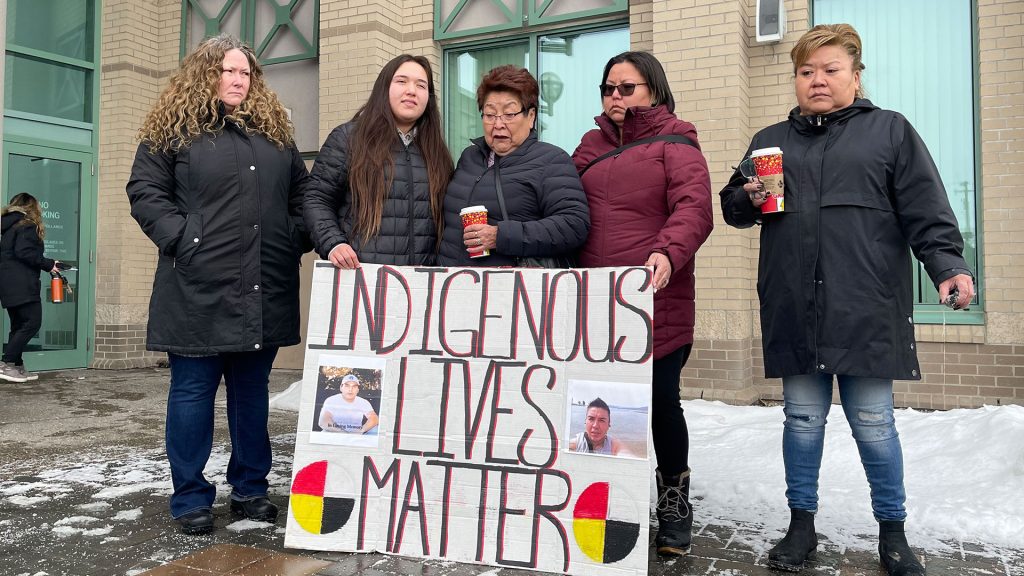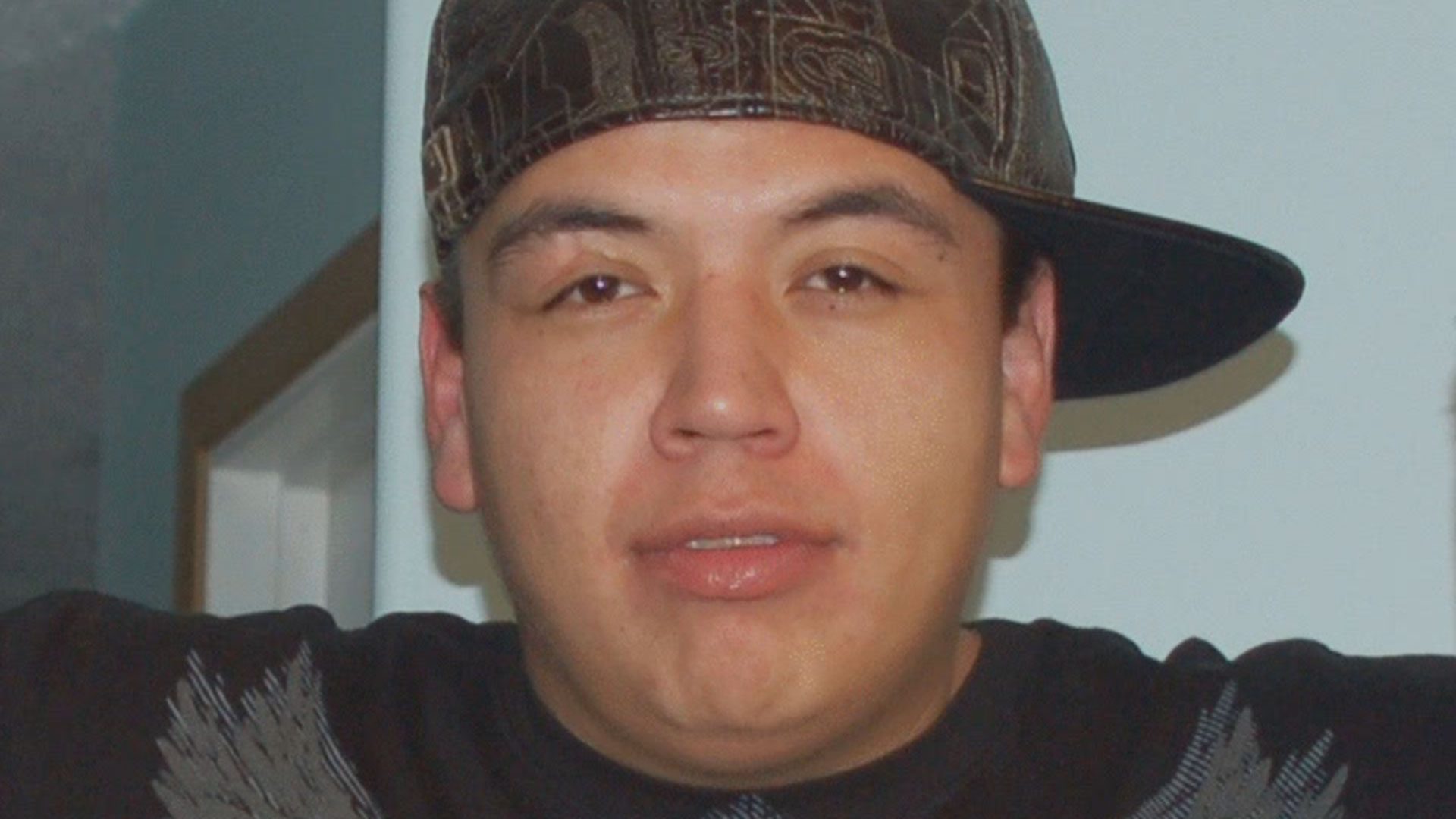
Dale Culver's family outside Prince George courthouse
The family of Arthur Culver, also known as Dale Culver, “remains unwavering” in its search for justice, despite years of waiting for justice said a statement released Thursday by the B.C. Civil Liberties Association.
“We have been cautioned by other Indigenous families ‘don’t trust the process’ but we don’t have a choice,” Culver’s cousin Debbie Pierre told APTN News in an interview about the nearly seven year wait for justice for Culver.
Culver, 35, was a father of three from the Gitxsan and Wet’suwet’en Nations.

He was arrested in Prince George, B.C., on July 18, 2017, after police were called about a man allegedly casing vehicles. The independent office that investigated the case says the Culver was pepper-sprayed during the struggle.
He had trouble breathing and died in custody.
The B.C. Civil Liberties Association said despite an independent review in 2019 found “reasonable grounds” to believe two officers may have committed offences related to use of force and three others may have obstructed justice, the Crown was not handed a final report until 2020, and the approval of charges took nearly three more years.
Const. Paul Ste-Marie and Jean Monette have been charged with manslaughter, while Sgt. Jon Eusebio Cruz and Const. Arthur Dalman and Clarence MacDonald are accused of attempting to obstruct justice, the BC Prosecution Service said Wednesday. The charges against them have not been tested in court.
Read more:
Culver’s family has been waiting 6 years for answers. Now they face another delay
“We want the public to know how difficult it has been for us since my dad was killed,” Lily Speed-Namox, Culver’s eldest daughter who is now a young adult, told the Canadian Press.
“We have been in the dark throughout much of this process.”
Pierre said that Culver’s youngest child youngest child was less than six months old at the time of his death and will be turning six in a few weeks.
Pierre told APTN that the waiting for justice has been difficult.
“A lot of us are frustrated and we also do not feel safe because of the level of uncertainty,” said Pierre.
Memories of Culvert also bring the family comfort during the wait.
“He was a very comical individual,” Pierre remembers of her cousin, who spent a lot of tiem with her family when Culvert was growing up.
“You just have to have a big chuckle every time you are around him…and he had such a big heart for family,” said Pierre.
The case is highlighting delays in the civilian oversight process, while renewing debate about whether police body cameras would enhance transparency and accountability.
“Not only is Dale’s case historic, but it is happening during a time when BC’s Police Act is under review. This is the perfect time for the government to commit to implementing the Declaration on the Rights of Indigenous Peoples Act, bringing policing legislation in line with BC’s domestic and international obligations. We do not need any more inquiries, committees, or reports. What we need is transformative change,” said Meghan McDermott, the policy director for the BC Civil Liberties Association in a press release.
The chief civilian director of B.C.’s Independent Investigations Office, Ronald MacDonald, addressed the delay in a statement, calling it “unacceptable and unfair.”
But the IIO’s investigation into Culver’s death was “exceptionally complex” and “extraordinarily demanding in terms of resources,” said MacDonald. He said the office has been hindered in attracting and retaining investigators as he renewed calls for greater funding and changes to its compensation model.
“Without changes, there can be no reasonable expectation that the IIO will be able to continue delivering fair and thorough investigations to the standard required in a timely fashion,” he said, adding that “passion for justice only gets one so far.”
The First Nations Leadership Council also issued a statement last week, saying it supports the charges and stands with Culver’s family and communities.
Regional Chief Terry Teegee of the B.C. Assembly of First Nations said the charges were a “positive step” toward a national effort to ensure Indigenous and racialized people in Canada “are not subject to the discrimination and injustice that is so deeply inherent in the justice system.”
Grand Chief Stewart Phillip with the Union of B.C. Indian Chiefs said he was “relieved” by the charges, adding that “investigations into RCMP conduct, including police-involved deaths, are taking far too long.”
Roughly six months after Culver’s death, the BC Civil Liberties Association wrote to the chairperson of the civilian review and complaints commission for the RCMP, saying it was aware of reports from eyewitnesses that Culver “was taken forcibly to the ground by RCMP members immediately after exiting a liquor store, apparently unprovoked.”
The letter also raised what it called “troubling allegations” that RCMP members told witnesses to delete any cellphone video.
“This would provide a strong basis on which to question the accuracy of certain RCMP members’ statements to investigators and notes, as well as RCMP public statements,” the association said.
Brian Sauvé, president of the National Police Federation, said in a statement Wednesday that in-custody deaths are rare and tragic and the nearly six-year wait for charges was “unacceptable” for Culver’s family and the officers involved.
Plans to deploy body-worn cameras across the country would help protect police and the public, providing transparency, evidence and accountability, he said.
Since Dale’s death, there have been 388 police-related deaths in British Columbia, according to the BC Civil Liberties Association.
APTN reached out to the BC Presecution service for information on the delays from 2023 in the Mounties court cases but did not hear back by publication.
With files from the Canadian Press










